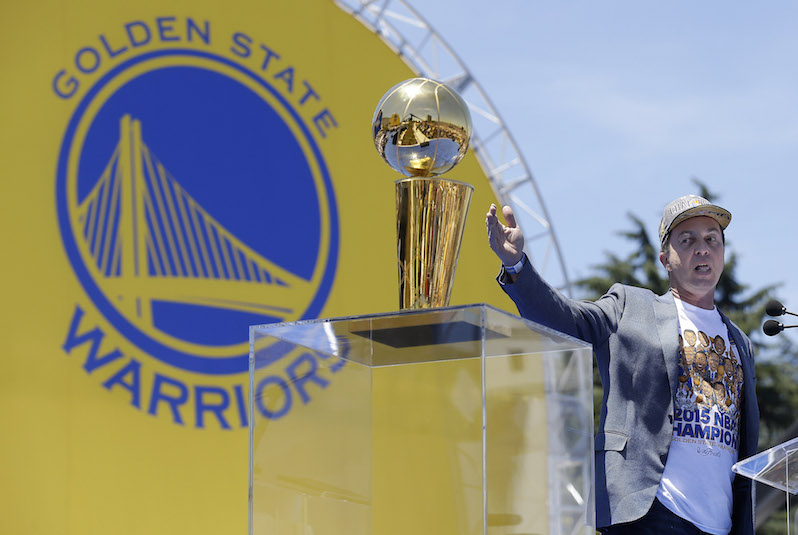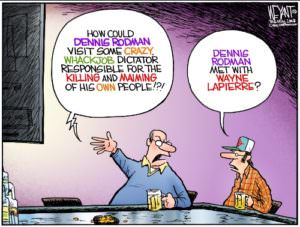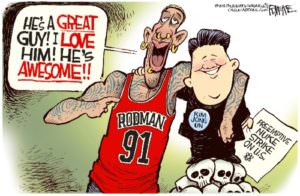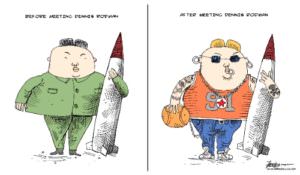Hubris Costs Warriors NBA Championship
Owner Joe Lacob should have been the voice of reason But he—like the rest of the Golden State team—got caught up in a regular-season record chase and lost sight of the ultimate prize Owner Joe Lacob should have been the voice of reason. Golden State Warriors owner Joe Lacob will have to wait until next year to get another shot at winning the NBA title. (Jeff Chiu / AP)
Golden State Warriors owner Joe Lacob will have to wait until next year to get another shot at winning the NBA title. (Jeff Chiu / AP)
Golden State Warriors owner Joe Lacob will have to wait until next year to get another shot at winning the NBA title. (Jeff Chiu / AP)
A funny thing happened on the way to becoming the greatest team in NBA history.
Now that the 73-9 Golden State Warriors are toast, it’s hard to remember as far back as March, but that’s when Joe Lacob, the venture capitalist who owns the team, lavished praise on himself and his people in a New York Times profile.
“The great, great venture capitalists who built company after company, that’s not an accident,” Lacob announced. “And none of this is an accident, either. … We’ve crushed [opponents] on the basketball court, and we’re going to for years because of the way we’ve built this team. We’re light-years ahead of probably every other team in structure, in planning, in how we’re going to go about things.”
Oops.
The piece ran in the Times’ magazine, but it would have fit as easily in the financial section as in the sports section.
For even a venerable newspaper like The New York Times, there’s an irresistible temptation to present winners as all-knowing, or at least provide a platform for them to proclaim their greatness. The urge is as great to scorn losers for their obvious know-nothingness.
Of course, it’s a zero-sum game, so today’s winner may very well turn into tomorrow’s loser—ask the Warriors—but the effect is the same.
Someone will always be up, giving the press and the audience icons to believe in. It’s why CEO pay runs astronomically and stubbornly high in good times and bad.
This just in: Lacob’s place in the firmament has just been taken by Cleveland Cavaliers owner Dan Gilbert, the Quicken Loans magnate who had exhibited a leaden touch to this point, going through four general managers and seven coaches since 2005, denouncing LeBron James (“the self-styled king”) for his “cowardly” decision to leave Cleveland, then, amazingly, seeing the Akron-born James return four years later just because it was home.
The Cavaliers, a mere 57-25 team in the weaker Eastern Conference, were major underdogs before the Finals and off-the-charts long shots after Game 4 when they trailed 3-1 in the series.
According to the numerology that also holds sway on financial pages and sports sections, there was no point in going forward. Of the 32 teams that had trailed 3-1 in an NBA Finals series, none had ever come back to win the championship. Only two had forced a Game 7.
Surprise.
Of course, there was a point in going forward. The Warriors had just proved it, coming back from 3-1 down to beat Oklahoma City in the Western Conference Finals.
Of the 232 teams that had ever trailed 3-1 in a seven-game series, only nine had come back to win, but the Warriors became No. 10.
Unfortunately, the last thing the Warriors needed was such a draining series after a season in which they were foolhardy enough to pursue the Bulls’ record of 72 wins to the last game.
Coach Steve Kerr left the decision of chasing the record up to his players, which was like leaving the time your teenage kids have to be home at night up to them.
“Our team wants it,” Kerr said in March. “They’ve made it pretty clear, so what we’re doing is listening to them and trusting them that if they’re injured, they’re going to let us know. And if that’s the case, we’ll give them a rest. And if they’re not and they feel like they’re perfectly capable of getting out there and playing and that’s what they want to do, then that’s what we’ll do.”
Oops.
Something went wrong, and it wasn’t just Steph Curry’s sprained knee and ankle that sidelined him for six games in the first two rounds.
By the West Finals, the back-to-back MVP—and first ever selected by unanimous vote—looked like he was feeling the toll of all his minutes and all his dings.
Curry and Kerr pooh-poohed the notion that he was hurt, as you would have expected, but Steph’s brother, Seth, a Sacramento guard offered a different assessment, telling USA Today, “It wasn’t really documented last year, but Steph was banged up throughout the playoffs like anybody was, and this year’s no different. … It’s a matter of who can play through certain injuries and the adjustments you make because of that.”
Steph finished the West Finals in Steph fashion, scoring 31, 31 and 36. He started the Finals scoring only 11 and 18. The Warriors went up 2-0 anyway, so nobody noticed.
At that time, a source told me that Steph had consulted an orthopedist in Southern California. His MRI showed sore knees and issues with both shoulders, some of which, the source said, would require surgery.
Steph went downhill from there, averaging 22 points in the Finals, down from the 30 he averaged in the regular season, shooting 40.3 percent after 50.1 percent during the season.
In the ultimate crunch time of Game 7, he scored 16. Only three came in the fourth quarter, when he missed five of six shots.
We’ll see what treatment Steph undergoes this summer, but if the Warriors could do it over, they wouldn’t be likely to knock themselves out chasing a record that now means absolutely nothing to them.
Of course, that’s where the owner comes in, or should have, the more so if he and his people are “light-years ahead of probably every other team in structure, in planning, in how we’re going to go about things.”
It was understandable if Kerr, who was in it with his guys, erred on the side of trusting them to tell him if they were running themselves down, assuming—hopefully—they realized it themselves.
Lacob was the one who could tell them to knock it off, they had bigger fish to fry. Unfortunately, he was busy being full of himself.
Forget light-years. A standard year, which is how long the Warriors will have to wait to get back to the Finals (they hope), will be long enough.
Your support is crucial…With an uncertain future and a new administration casting doubt on press freedoms, the danger is clear: The truth is at risk.
Now is the time to give. Your tax-deductible support allows us to dig deeper, delivering fearless investigative reporting and analysis that exposes what’s really happening — without compromise.
Stand with our courageous journalists. Donate today to protect a free press, uphold democracy and unearth untold stories.







You need to be a supporter to comment.
There are currently no responses to this article.
Be the first to respond.